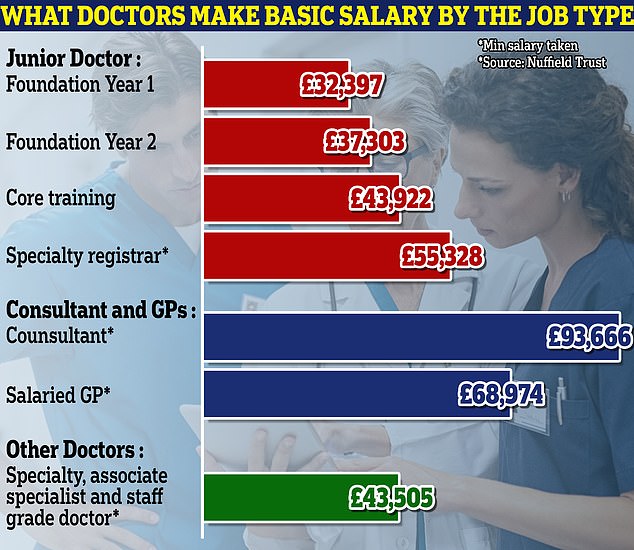Junior doctors go on strike… again! Militant union announces five more days of strikes at the end of February in a plot to bring NHS hospitals to a standstill again
The NHS’s junior doctors will strike again, announcing a new wave of five days of industrial action for later this month.
Medics will join the picket lines from February 24 to 28, with the British Medical Association (BMA) saying the government has rejected its ‘gesture of goodwill’.
It is the latest round of protracted strike action that has seen thousands of appointments canceled since the wage dispute began last year.
The union said it had offered Health Minister Victoria Atkins the opportunity to prevent further strikes by extending the BMA’s current strike mandate, which currently expires in the spring, so talks could continue. But they said she refused.
On news of the new strikes, Ms Atkins hit back at the union, saying it shows they are not ‘willing to be reasonable’.
Junior doctors on the picket line outside St Thomas Hospital in London during the latest wave of strikes in January
She said: “This action called for by the BMA Junior Doctor Committee does not indicate that they are prepared to be reasonable.
“We have already given them a pay increase of up to 10.3 percent and were prepared to go further.
“We urged them to make an offer to their members, but they refused. We are also open to further discussions on improving the working lives of doctors and the wider workforce.”
Ms Atkins added that the newly announced strike action will put pressure on the NHS and is ‘not in the spirit of constructive dialogue’, and said the union should call it off.
“To move forward, I am asking the Junior Doctors Committee to cancel their action and come back to the table to find a way forward for patients and our NHS,” she said.
The strikes will start from 7am on February 24 until just before midnight on February 28, meaning they will last a total of five days.
In a joint statement, BMA doctors’ committee co-chairs Dr Robert Laurenson and Dr Vivek Trivedi said the strikes could have been avoided if the government had agreed to come to the negotiating table.
“Even yesterday we were willing to postpone further strike action in exchange for a short extension of our current strike mandate,” they said.
‘If the Minister of Health had agreed to this, an act of good faith on both sides, the talks could have continued without further strikes. Unfortunately, the government refused.
“The glacial speed at which the government is making progress is frustrating and incomprehensible.”
They added that despite Ms Atkins’ statements during the latest round of strike action that she would meet trainee doctors ‘within 20 minutes’ if no strikes were planned, it was more than 20 days before they were offered a meeting.
But they said the union is still willing to cancel the upcoming strikes if a credible wage offer is made.
‘From the very beginning of the industrial action we have been clear that there is no need for strike action as long as substantial progress is made, and we remain prepared to continue discussions and cancel future strikes if significant progress is made and a credible offer,” they said.
Sir Julian Hartley, director of the membership organization for healthcare providers, NHS Providers, said the strikes were ‘another blow’.
‘Seventy days of industrial action within the NHS in England since December 2022, which has cost the NHS around £3 billion and postponed more than 1.4 million routine appointments and procedures, has increased pressure within the NHS.
‘Patients who have to wait even longer for the care they need are a major concern.’
He urged ministers and unions to “return to serious talks” to resolve the dispute.
“We have to see light at the end of the tunnel,” he said.
‘Trust leaders want to be able to focus all their energy on providing first-class care to patients and reducing waiting lists, rather than having to spend too much time planning and dealing with disruptive strikes.’
The BMA’s new wave of strike action comes just a month after the previous one, which last saw young medics take to the picket lines for a record six days of strike action.
This action alone led to the cancellation of nearly 114,000 patient appointments.
While previous strikes have led to the cancellation of elective care, emergency services such as emergency departments have remained open and officials have urged Britons in need of urgent medical care to still seek help if necessary.
The BMA is campaigning for a huge 35 percent salary increase for trainee doctors.
It claims its demands are for ‘pay recovery’ as previous NHS pay rises for doctors since 2008 have failed to keep pace with inflation.

Ministers today called on union bosses to ‘come back to the table’, while senior MPs accused striking medics of ‘holding the country hostage’ and called the move ‘an act of cruelty’. Junior doctors in their first year now have a basic salary of £32,300, while those with three years’ experience earn £43,900. The oldest earn £63,100
Junior doctors in their first year now have a basic salary of £32,300, while those with three years’ experience earn £43,900. The oldest earn £63,100.
Ministers previously offered trainee doctors an average pay increase of 8.8 percent for the 2023/2024 financial year.
However, the increase was larger for first-year doctors, who received a boost of 10.3 percent.
Ministers emphasized that this was the final offer. But Ms Atkins offered doctors an additional 3 percent on top of this increase.
But the union said at the time that this improved amount was still “completely insufficient.”
The NHS in England has been plagued by strike action for more than a year now.
Doctors, nurses, paramedics and physiotherapists have at one point entered the picket lines, causing more than 1.3 million appointments to be cancelled.
